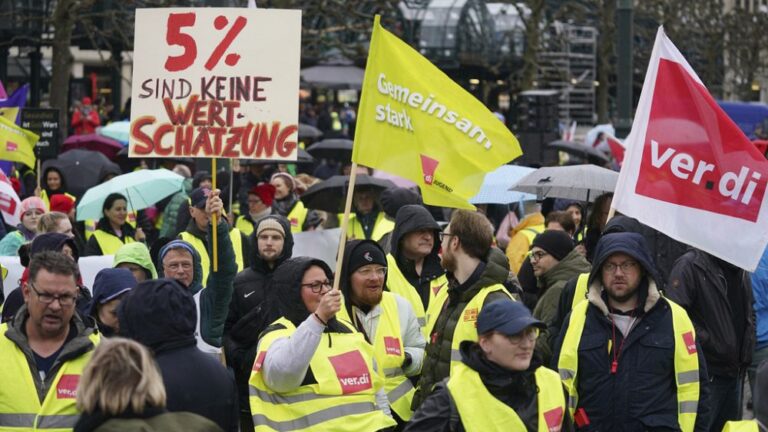Germany woke up to widespread travel unrest on Monday, after two of the country’s largest transport unions called a nationwide strike. This is the biggest strike the country has seen in 30 years.
The Verdi service workers’ union and the EVG union, which represents many train workers, have announced a walkout.
Rarely do unions join forces like this Germany. The general strike follows a series of failed talks with employers in recent weeks.
“We think there will be broad participation in the strike,” Verdi chief Frank Werneke told a press conference.
This is not the only strike planned in Europe – for details on other countries, read this article.
When is the strike in Germany?
Officially, the German strike began at midnight in the early hours of Monday, March 27 and is scheduled to last throughout the day on Monday.
However, some airports have canceled flights scheduled to arrive or depart on Sunday.
The effects are likely to last until Tuesday, with some operators already canceling services that day as well.
Which airports and train stations will be affected by the German strike?
The strike is nationwide and the unions involved represent the majority of transportation worker Verdi represents more than 2.5 million public sector employees, while EVG represents around 230,000 workers in railways and bus companies.
Flights were suspended at Munich and Frankfurt, two of Germany’s largest airports, as well as at Bremen, Hamburg and Stuttgart airports. Rail operator Deutsche Bahn has canceled its long-distance train services.
Below are details of operators who have already announced disruption. This article will be updated if more announcements are made.
How will trains in Germany be affected?
German rail operator Deutsche Bahn announced on Thursday that no long distance trains would run on Monday, with “many trains” also being canceled on Tuesday. They urged passengers due to travel on Monday to postpone their trip to the next day if possible.
In a statement, they said, “This will affect all German train operations, as employees from all areas of Deutsche Bahn and other train companies have been called to walk out…long-distance traffic of Deutsche Bahn is therefore completely discontinued.”
“According to the union’s statements, the first effects of the employees’ strike were possible on Sunday night. Also on Tuesday many trains will be canceled due to the effects of the strike,” it added.
DB announced that most regional trains would also be offline for the day.
Furthermore, some trains may be canceled on Tuesday due to knock-on effects.
Workers with Transdev, AKN, Osthannoversche Eisenbahnen, erixx, vlexx, eurobahn, and Länderbahn are also affected.
That means that in addition to Deutsche Bahn, which runs services such as the commuter S-Bahn and regional trains in German cities, local transport will be disrupted in seven of Germany’s sixteen federal states. It includes some of the country’s most populous states: Bavaria, Baden-Württemberg, Hesse, Lower Saxony, North Rhine-Westphalia, Rhineland-Palatinate, and Saxony.
Swiss rail operator SBB says it will provide replacement trains for cross-border trains between Switzerland and Germany on the Swiss section of the route, but the number of seats on these trains may be reduced.
The company strongly discourages travel on March 27 and warns its online timetables may not reflect delays due to the strike.
Will flights to Germany be cancelled?
Germany’s busiest airport, Frankfurt Airportit said it was canceling all flights on Monday.
“All activities enabling full flight operations have been suspended due to the strike,” the airport’s operating company Fraport announced.
Munich Airportthe country’s second busiest hub, has announced that there will be no passenger flights on Sunday and Monday.
Bremen, Dortmund, Hamburg and Stuttgart airports have also canceled all flights – both departures and landings – with more airports likely to follow.
Düsseldorf Airport warned passengers to expect serious disruption on Tuesday morning, with almost all flights canceled on Monday morning. The airport advised passengers to keep hand luggage to a minimum to help ease security delays in the unlikely event their flight is still operating.
Major disruptions are also expected at Cologne/Bonn Airport. At Leipzig and Dresden airports, all German domestic flights were cancelled.
While Karlsruhe/Baden-Baden Airport is not expecting cancellations, passengers should prepare for longer waiting times as security checkpoints go on strike. Passenger flights were canceled at Nuremberg Airport.
Travelers are advised to contact their airline directly to find out if their flight is operational.
Why did transport workers walk out in Germany?
As in many other countries, the Germans are struggling with surging inflation after Russia’s invasion of Ukraine sent food and energy costs solling.
Verdi has been engaged in a series of salary negotiations, seeking a 10.5 percent pay increase. Employers offered a total of 5 percent in two stages plus a one-off payment of €2,500.
EVG is looking for an increase of 12 percent. Deutsche Bahn, Germany’s main railway operator, also offered two-stage increases totaling 5 percent and a one-time payment.
Germany’s annual inflation rate in February was 8.7 percent.
